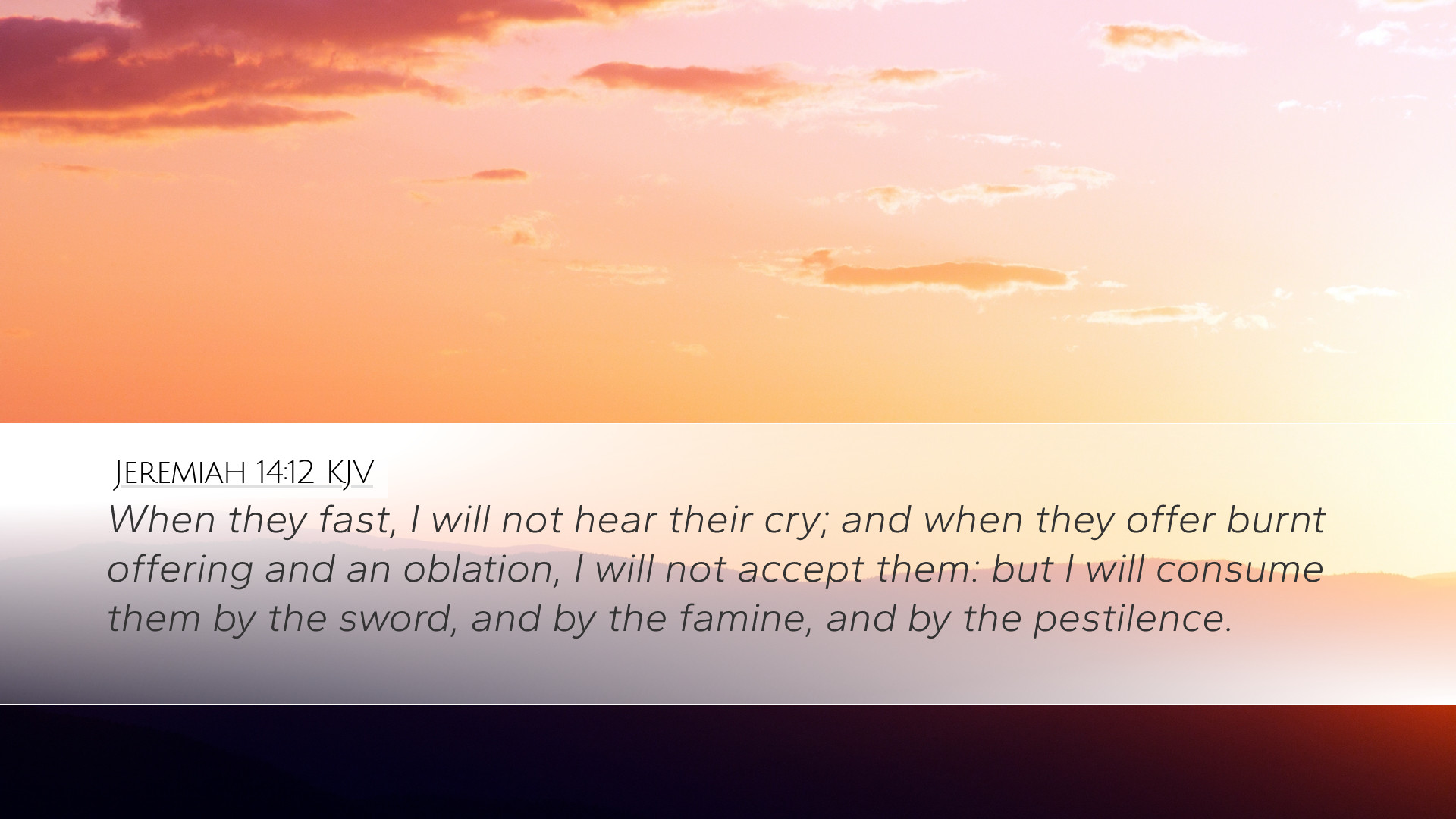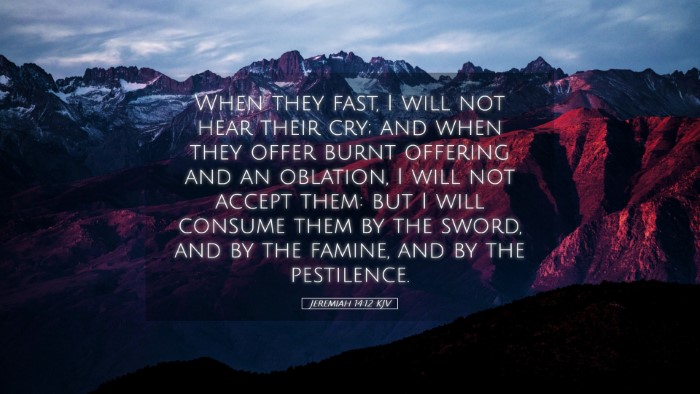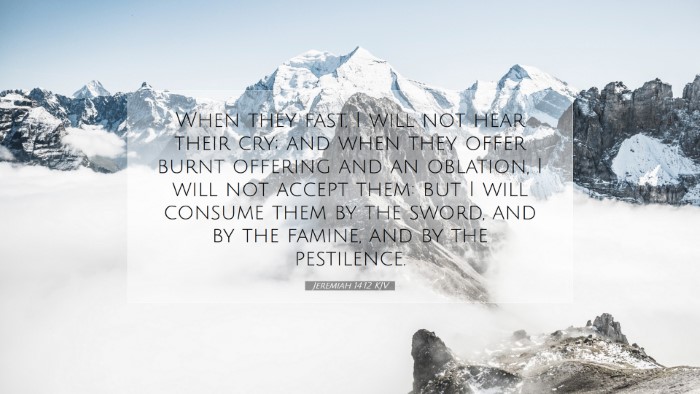Commentary on Jeremiah 14:12
Text of Jeremiah 14:12 (KJV): "When they fast, I will not hear their cry; and when they offer burnt offering and an oblation, I will not accept them: but I will consume them by the sword, and by the famine, and by the pestilence."
Introduction
This verse presents a powerful declaration from God through the prophet Jeremiah, illustrating the severity of divine judgment upon a wayward nation. The context involves a period of great distress in Judah, as the people grappled with drought and imminent judgment. This commentary synthesizes insights from established biblical scholars to elucidate the meanings and implications of this verse.
Contextual Background
Jeremiah's ministry occurs during a tumultuous time in Israel's history, characterized by idolatry, social injustice, and spiritual apathy. The people of Judah faced historical calamities, including invasions and their ultimate exile. This verse can be interpreted within the broader scope of Jeremiah's call to repentance and his role as a prophetic mouthpiece against the sins of the nation.
The Significance of Fasting and Offerings
Rituals and Their Meaning: The verse underscores the futility of ritualistic practices devoid of genuine faith and repentance. Fasting and offerings were integral to the Israelite tradition, serving as expressions of devotion. However, God indicates that mere performance of rituals without corresponding heart change is unacceptable.
- Matthew Henry: Points out that rituals often become meaningless if they are not accompanied by true contrition and a change of heart. He emphasizes God's disdain for empty acts of worship and highlights the need for authenticity in one's relationship with the Divine.
- Albert Barnes: Notes that the people continued their religious practices even while remaining in rebellion against God. Barnes suggests that God’s rejection of their sacrifices demonstrates His demand for integrity and righteousness rather than just compliance to law.
- Adam Clarke: Further elaborates on the idea that fasting is a time for introspection and penitence, and if the heart remains hardened, fasting alone becomes a hollow exercise.
Divine Rejection and Future Judgment
The latter part of the verse emphasizes God's pronouncement of judgment. The phrase "I will consume them by the sword, and by the famine, and by the pestilence" is a stark warning of consequences that reflect the severity of divine displeasure.
Consequences of Unrepentance: The illustration of divine retribution serves to instill a serious understanding of God's holiness and justice. Pastors and theologians must remind congregations that while God's mercy is profound, so is His righteous anger against persistent sin.
- Matthew Henry: Discusses how the outlined judgments serve as both a punishment for sin and a means of correction intended to lead the wayward back to repentance.
- Albert Barnes: Argues that these judgments were not arbitrary but rather a natural consequence of the people’s choices to turn away from God's covenant.
- Adam Clarke: Highlights that God’s interventions in the form of famine, sword, and pestilence are ultimately aimed at restoring the faithfulness of His people, acting as serious but necessary realizations of their dire situation.
Theological Reflections
This verse prompts a rich theological reflection on the relationship between divine grace and human response. It challenges the reader to consider how often they may engage in religious practices without accompanying genuine faith. For pastors and scholars, it poses questions regarding the nature of worship and the importance of righteousness beyond mere rituals.
God's Sovereignty in Judgment
Understanding God's sovereignty remains critical in interpreting this passage. While the people fast and offer sacrifices, God maintains ultimate authority over acceptance of these acts. His willingness to reject them serves not only as a warning but also as an affirmation of His sovereign nature as He pursues genuine relationship over mere ritualistic adherence.
This Message Today
In a contemporary context, Jeremiah 14:12 serves as a potent reminder that the insistence on authenticity in worship is timeless. It challenges today’s believers to reflect introspectively on their motives when engaging in worship practices.
- Matthean Application: Pastors can use this text to urge congregations towards heartfelt worship rather than mere adherence to tradition.
- Spiritual Formation: The call to authenticity in worship can be articulated in discussions on spiritual disciplines, emphasizing that real transformation comes from inner change rather than external practices.
Conclusion
Jeremiah 14:12 stands as a significant proclamation of God's expectation for genuine worship from His people. Through the insights provided by commentaries, it is clear that empty rituals are unacceptable in the face of a holy God who desires truth within the inner being. This verse not only speaks to the historical context of Judah but resonates powerfully with the ongoing need for authentic spiritual engagement in today’s church. As believers, it invites deep reflection on our relationship with God, prompting us to ensure our practices of faith are sincere.


